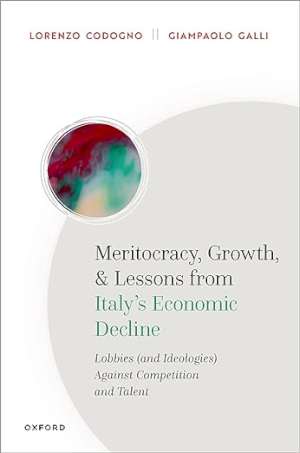21 March 2024
Meritocracy, Growth and Lessons from Italy's Economic Decline
Lorenzo Codogno and Giampalo Galli
2022, Oxford University Press, 256 pages,
ISBN 9780192866806
Reviewer: William A Allen, NIESR

The distinguished Italian economists Lorenzo Codogno and Giampaolo Galli aim in this book to identify the reasons for Italy’s slow economic growth. Italy certainly has a growth problem: total factor productivity, in other words the residue of economic growth after allowing for growth in labour and capital inputs, actually fell at an annual rate of ½% between 1995 and 2019. Low growth means that the amount of debt that a country can sustainably carry is relatively low, and that is a particular problem for Italy, which has a lot of debt.
The authors discuss carefully and thoroughly the possible reasons for low growth. The leading suspects are bureaucracy (too much of it), governance (opaque), finance (see governance), justice (too slow), labour (excessively and badly regulated), education (poor quality), competition (inadequate and stoutly resisted by powerful lobbies), public debt (too much), the rhetoric of inequality (too powerful), and misunderstandings between Italy and the EU (dangerous).
These factors may be the proximate causes of low growth, but why are they more powerful in Italy than elsewhere? The authors address this question, though not as fully as readers might wish. One common feature of them is bad government. Ambrogio Lorenzetti’s 14th century masterpiece ‘Allegory of good and bad government’, on display in the Palazzo Pubblico in Siena, contrasts a well-governed and therefore prosperous city with an ill-governed and therefore poor and violent one. Governments are supposed to provide order, but if they don’t, that essential function is taken over by other parties, such as gangs like the mafia, or powerful families and their circles of friends and associates.
This, according to Codogno and Galli, has happened in Italy. They quote a telling remark by the statesman Giovanni Giolitti that laws are to be applied to enemies and interpreted for friends. Italian laws are complicated and you need good connections to understand them and if necessary get round them. And some laws are just bad: for example, the labour laws are so restrictive – the legacy of absurd egalitarian zeal – that the labour market has become dysfunctional. Incumbent employees enjoy bullet-proof protection. Their wages and salaries are highly regulated. In the inflationary 1970s it was decreed that a given increase in prices, say 10%, should be compensated by an equal absolute increase in all wages and salaries. This had disastrous consequences: differentials among wages disappeared, and those earning lower than average wages gained from inflation. Consequently, labour in Italy is organised in ways which enable many types of work to escape the dead hand of regulation.
These failures of government, the authors say, have prevented the emergence of a meritocracy in Italy. Personal connections are more important than ability, and it is impossible to reward ability or hard work with money. Family-run firms predominate, and non-family members find it hard to get important jobs in them. Powerful lobbies prevent monitoring and assessment of labour quality, e.g. among teachers and magistrates. In a situation where growth depends increasingly on innovation rather than emulation of practices in richer countries, this is a massive obstacle to growth.
The authors draw attention to the disparity in wealth between the richer north and the poorer south of Italy, which persists despite large and long-standing subventions from north to south. Their explanation is that the impediments to growth are more powerful in the south. Specifically, the government is perceived as less legitimate there: the mafia was for a long time perceived as a legitimate power against the northern-dominated Kingdom of Italy.
British readers, nervous about their own country’s growth prospects, may wonder how much of the book’s analysis applies to the United Kingdom. For example, Italy’s experience with its north/south divide makes you wonder about the prospects for levelling-up, which was first attempted here as long ago as 1934. Certainly, monitoring of employees’ performance, inadequate in Italy according to the authors, is well developed in Britain – indeed perhaps overdeveloped, as any teacher will tell you. Yet the lack of seriousness which has bedevilled Italian politics has its echoes in this country. Codogno and Galli don’t tell us how good government can stimulate growth, but they have plenty to say about how bad government can stop it. Their book is well worth reading.
